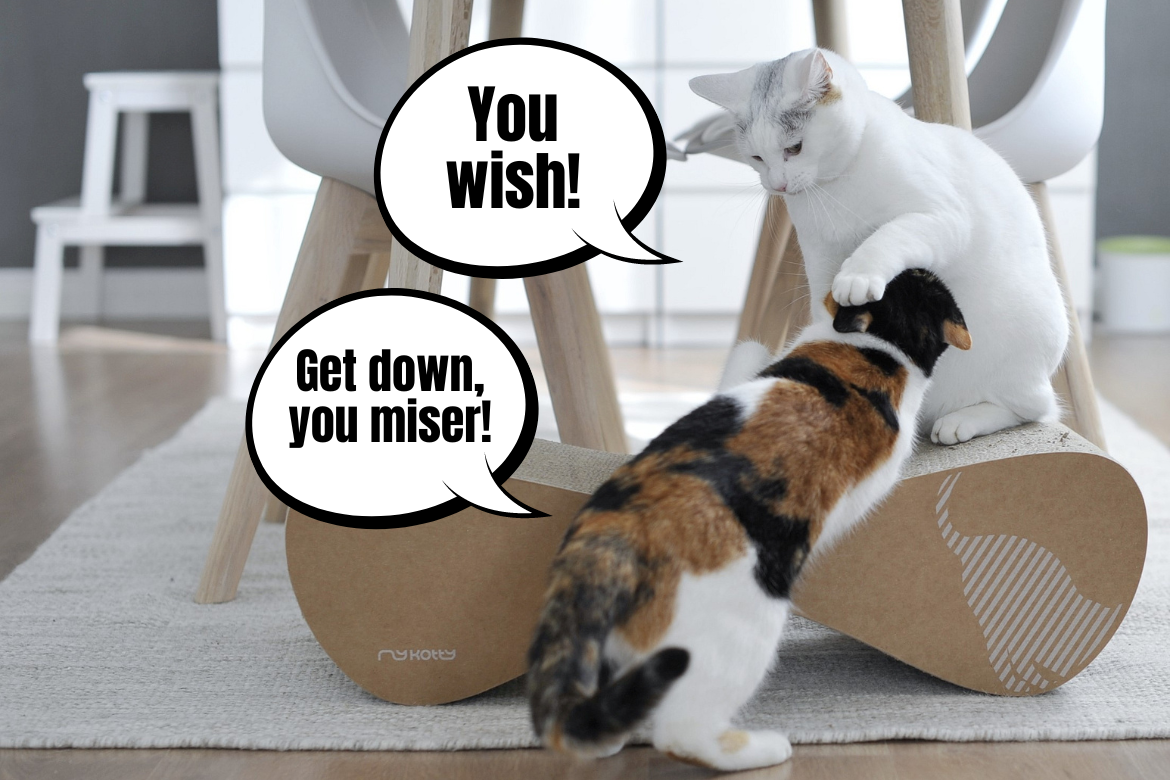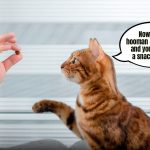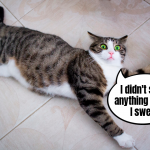The topic of cats’ emotions is very fascinating. Although cats have been living alongside hoomans for thousands of years, understanding their nature, feelings, and communication is something that we, as Carers, still have a lot to learn about. On the one hand, we’re dealing with predators – animals with a strong personality and instincts they’ve inherited from their ancestors. On the other hand, we’re still talking about our furry feline friends who take up our favorite spot on the couch and panic when they see nail clippers. How are we supposed to understand that?! Today we’re taking on a topic we’ve been thinking about while observing our cats at Team myKotty. Do cats get jealous about their scratchers, cat beds, toys, or their people? Good question!
How do cats express their emotions?
From the hooman’s point of view and the ways that we are able to read and interpret cats’ emotions, their body language is one of the most important pillars of cat-hooman communication. After all, by watching cats’ behavior, their specific movements, facial expressions, and their reactions to specific stimuli, specialists, and behaviorists who study cats are able to draw conclusions about what the cat is actually thinking about. We, as cat Carers, often get to know our own cats well enough to understand their reactions and know if the cat is scared, stressed out, happy, curious, or just chilling. But is there any space for jealousy in the cat’s book of emotions and how would cats show it?
As it turns out, yes – domestic cats can get jealous and show it in very specific situations by letting us, or other cats, know that their situation is not ideal. An example: a cat has always lived as a singleton and all the attention of the hoomans was on them. When a new cat joins the family, the Carers usually spend more time with the newbie – not just because of their needs while the cat adapts to the new environment, but also for the simple fact of wanting to bond with the new kitty. At the same time, to make it easier for the two cats to get to know each other, the recommendation is to do a slow introduction in which the cats don’t interact directly with each other for some time. The resident cat is aware that there’s an intruder at home (first red flag), his access to one of the rooms at home has been cut off (second red flag), and on top of all that, the Hooman spends much more time with the young kitten, breaking the natural routine of the day (third red flag). For a sensitive cat, changes like that can be too much and to show how unhappy they are with them, the resident cat can start destroying furniture, peeing outside the litter box, knocking things off the shelves, and causing mischief they’ve never attempted before. By doing things that are not typical for them, the resident cat is trying to show their Hooman that they don’t understand the new situation or don’t feel comfortable with it.
Is it jealousy yet?
Following the story above we can wonder what, in the context of cats, jealousy actually means. Because the situation we described and the emotions the cat felt was not exactly what we, as hoomans, would understand by jealousy – a want to have something someone else has. When it comes to cats, jealousy is more so a reaction to a change in their life circumstances, a change in their routine on which they’ve built their sense of security and comfort.
A cat can’t be jealous and miss something they’ve never experienced. They won’t envy an Instagram celebrity and be jealous of their new cat bed because they’ve never actually had a chance to test this bed out. However, if there are two cats at home and one of them suddenly takes up all the hooman’s attention, the other one might feel ignored and don’t accept this fact as the situation is far from something the cat’s used to.
What’s interesting, a cat can be jealous not just of other cats, but also of people or items that take their hooman’s attention away from the cat. If the kitty has always had playtime with their Carer at 9 pm, but one day the hooman brings guests over and doesn’t find time to play, the cat won’t know what’s going on and why their routine has changed. In situations like this, the cat could show their jealousy by being naughty, just to get the hooman’s attention.
Cats are creatures of habit – they live for their routine
A cat feels confident when they know what to expect. Their life follows a strict routine and a set of rituals that make the cat feel safe, secure, and comfortable in their surroundings. Every time the routine gets broken and something’s out of the ordinary, the cat doesn’t like that, especially if it threatens their free access to basic resources like food, litter box, the territory, and its elements, or the Hooman.
Cats feel “jealous” when their access to one of the resources mentioned before is not certain. We already gave examples of situations where the cat loses the attention and access to their Carer, but the cat might also get jealous about the fact that the other cat took over their favorite scratcher, ate breakfast out of their bowl, went to sleep on the window sill, or took a nap on the hooman’s pillow. In the cat’s eyes, the other cat takes away a part of their territory. And the loss of control over one’s territory is the reason cats don’t necessarily like to share scratchers, cat beds, or their favorite spot on the window sill, even if they could easily fit there together. That’s just the rules! And this is why it’s important that we, as cat Carers, always provide all our cats with the same amount of attention, access to all the resources in the house, and scratchers, bowls, litter boxes, and toys in numbers that allow all cats to use them independently. And that’s true even if our cats get along great and never fight about anything.
What to do if we do see our cats get jealous? First of all, we have to interpret what they are jealous of and then adjust the environment at home and the routine in a way that makes all the cats feel secure and have all their needs 100% met. Fighting jealousy might take time, some shopping, or even a behaviorist’s intervention, but for the sake of the cat’s happiness, it’s worth it.
Have you, fabCats, ever noticed your cats behave in a way that would suggest jealousy? Share your stories in the comments.




